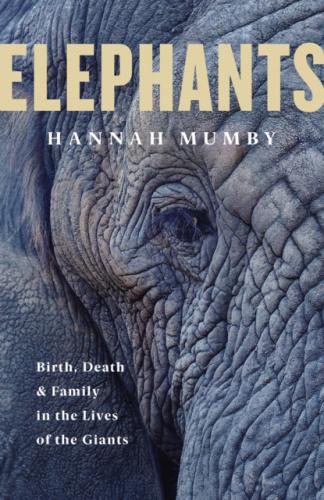THE SECRET LIVES OF ELEPHANTS
Birth, Death and Family in the World of the Giants
Hannah Mumby
William Collins
An imprint of HarperCollinsPublishers
1 London Bridge Street
London SE1 9GF
This eBook first published in Great Britain by William Collins in 2020
Copyright © Hannah Mumby 2020
Images copyright © Hannah Mumby unless otherwise specified
Cover photograph © Jennifer Latuperisa-Andresen/Unsplash
Hannah Mumby asserts the moral right to be identified as the author of this work.
A catalogue record for this book is available from the British Library
All rights reserved under International and Pan-American Copyright Conventions. By payment of the required fees, you have been granted the non-exclusive, non-transferable right to access and read the text of this e-book on-screen. No part of this text may be reproduced, transmitted, down-loaded, decompiled, reverse engineered, or stored in or introduced into any information storage and retrieval system, in any form or by any means, whether electronic or mechanical, now known or hereinafter invented, without the express written permission of HarperCollins.
Source ISBN: 9780008331719
Ebook Edition © June 2019 ISBN: 9780008331696
Version: 2020-03-15
Praise for The Secret Lives of Elephants
‘Combining lyrical writing about trumpeting at sunset with a pop science sensibility, [The Secret Lives of Elephants] is both smart and elegant. Walking with these elephants, and with Hannah, will appeal to the Planet Earth viewer and the Robert Macfarlane reader in equal measure.’
Dan Jones, Sunday Times and New York Times bestselling author of The Plantagenets and The Templars.
‘The Secret Lives of Elephants is an informative and entertaining memoir, in which scientist Hannah Mumby details her experience researching elephants in Africa and Asia. She works alongside conservation giants like Iain Douglas-Hamilton while unearthing connections between elephant and human life histories – often in the midst of alarming spikes in poaching. With descriptive prose, Mumby transports readers to Kenya, Myanmar and South Africa, where she and her colleagues discover surprising facets of elephant behaviour and intelligence.’
BBC Wildlife magazine
Quand je vous parle de moi, je vous parle de vous … Ah! Insensé, qui croit que je ne suis pas toi!
When I speak to you about myself, I speak to you about yourself. What mad person are you, to believe I am not you!
Victor Hugo
Contents
Copyright
Praise for The Secret Lives of Elephants
Epigraph
Prologue
1. Becoming an elephant
2. Samburu families
3. Oozies and elephants
4. How do they get so big?
5. Sex and baby Hannah
6. A team of rivals
7. Elephant in the mirror
8. Listen
9. Growing old
10. Death and ivory
11. If it doesn’t stay, we pay
Epilogue
Picture Section
References
Index
Acknowledgements
About This Book
About This Author
About the Publisher
What do you see when you look in the mirror? A sentient being? One with a family and broader social network, a history and memory? An individual with myriad identities, complex relationships fostered over a (potentially, hopefully) long life? Someone capable of expressing emotion, conveying information, communicating with and recognising lots of other individuals and members of other species? Someone aware that they’re looking at a reflection of themselves in the mirror?
When I look in the mirror, I see an elephant. That might sound implausible. Let’s peer again. Of course I see glasses (or the blur that comes with the lack of glasses) and blonde hair and more spots than a 32-year-old should ever have. I don’t see grey, wrinkled skin (at least not to the extent I could seriously be classified as a thick-skinned pachyderm) or tusks. I don’t have a trunk, although I heartily wish I did for practical purposes. But we all know that when you look in the mirror, it’s not actually you that you’re looking at, it’s a perception of reflection.
The reason I see myself as an elephant is that when you strip back all the packaging, I don’t think I’m different to an elephant in many ways. All the questions I posed above could be answered in the affirmative by an elephant if she were asked. You don’t even have to ask her; you just have to watch her live her life. In this book, I’m asking you to squint a little bit into the mirror and reflect on the fact that you might have a lot in common with an elephant. I will go through my experiences with elephants, loosely based around key landmarks in the map of an elephant (and human) life. I’ll discuss their behaviour, physical changes and interactions with humans they have over the course of their lives. The ultimate aim is to reintroduce you to elephants, not just as majestic and incredible creatures, but also as relatable individuals, friends or even family members, which they become to the people who live alongside them. This is not to lose the science or the wonder, but to give us the tools to rethink our approach to animals and perhaps our priorities in conservation (or just how we define our friendship circle). And to highlight the fact that who we are isn’t always as obvious as we might think.
To be very clear, this is not the book I intended to write. Early in the process, as a visiting scholar I sat on an oval of grass at Colorado State University, the bright sun glaring on the screen as I typed on my laptop. It was a devastatingly sunny early autumn day, unfamiliar enough to surprise
